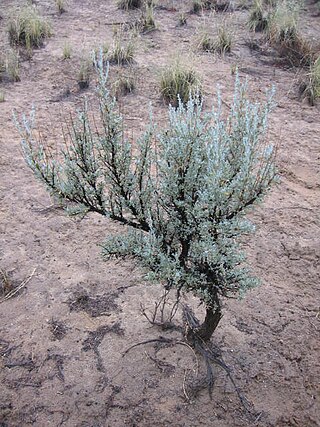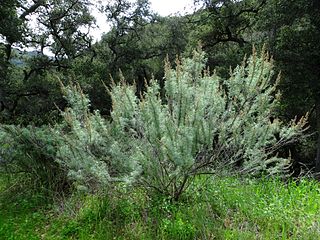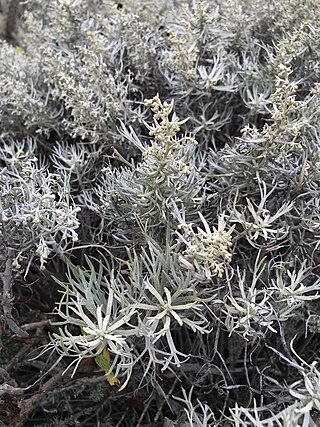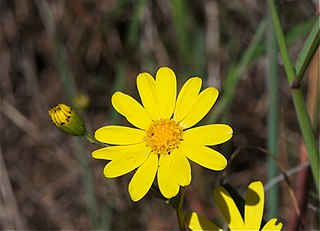
Artemisia tridentata, commonly called big sagebrush, Great Basin sagebrush or simply sagebrush, is an aromatic shrub from the family Asteraceae.

In biology and botany, indeterminate growth is growth that is not terminated in contrast to determinate growth that stops once a genetically predetermined structure has completely formed. Thus, a plant that grows and produces flowers and fruit until killed by frost or some other external factor is called indeterminate. For example, the term is applied to tomato varieties that grow in a rather gangly fashion, producing fruit throughout the growing season. In contrast, a determinate tomato plant grows in a more bushy shape and is most productive for a single, larger harvest, then either tapers off with minimal new growth or fruit or dies.

Linum perenne, the perennial flax, blue flax or lint, is a flowering plant in the family Linaceae, native to Europe, primarily in the Alps and locally in England. It has been introduced into North America, where it can be found on mountain ridges, wooded areas, and in sandy plain habitats of the sagebrush steppe, growing near sagebrush and rabbitbrush (Chrysothamnus).

Artemisia californica, also known as California sagebrush, is a species of western North American shrub in the sunflower family.

Platystemon is a monotypic genus of flowering plants in the poppy family containing the single species Platystemon californicus, which is known by the common name creamcups. It is native to Oregon, California, Arizona, Utah and Baja California, and is found in open grasslands and sandy soils below 6,000 feet (1,800 m) elevation.

Phoenicaulis is a monotypic genus of flowering plants in the family Brassicaceae found in western North America. It contains the single species Phoenicaulis cheiranthoides, which is known by the common names daggerpod and wallflower phoenicaulis. The genus name means 'reddish-purple stems', probably in reference to the tendency for the stems to take on such a color, and the species name means 'hand of flowers'.

Croton californicus is a species of croton known by the common name California croton. This plant is native to California, Nevada, Utah, Arizona, and Baja California, where it grows in the deserts and along the coastline.

Helianthus californicus is a North American species of sunflower known by the common name California sunflower. It is native to California in the United States and Baja California in Mexico, where it grows in many types of habitats.

Eulobus californicus, is a species of flowering plant in the evening primrose family known by the common name California suncup. It is native to California, Arizona, and adjacent northwestern Mexico, where it grows in scrub, chaparral, and desert plant communities.

Artemisia bigelovii is a North American species of sagebrush known by the common name Bigelow sagebrush or flat sagebrush. It grows in the deserts of the southwestern United States.

Artemisia nesiotica is a rare California species of sagebrush in the daisy family, known by the common name island sagebrush. It is endemic to the Channel Islands of California, found on 3 of the 8 islands.

Artemisia nova is a North American species of sagebrush, known by the common name black sagebrush. It is "one of the most common shrubs in the western United States".

Artemisia rothrockii is a North American species of sagebrush known by the common names timberline sagebrush and Rothrock's sagebrush.

Ceanothus pumilus is a species of shrub in the family Rhamnaceae known by the common names dwarf ceanothus and Siskiyou mat.

Nothocalais troximoides is a species of flowering plant in the family Asteraceae known by the common name sagebrush false dandelion. It is native to western North America, including British Columbia and the northwestern United States.

Pityopus is a monotypic genus of flowering plants in the family Ericaceae containing the single species Pityopus californicus, which is known by the common name pinefoot.

Senecio californicus is a species of flowering plant in the aster family known by the common name California ragwort.

Linanthus pungens is a species of flowering plant in the phlox family known by the common names granite prickly-phlox and granite gilia. It is native to western North America from British Columbia to Baja California and east to Montana and New Mexico.

Erigeron pumilus, the shaggy fleabane, or vernal daisy, is a hairy North American species of perennial plants in the family Asteraceae. It is widespread across much of western Canada and the western United States, from British Columbia east to Saskatchewan and south as far as Oklahoma and the San Bernardino Mountains of California. There have been reports of the plant growing in Yukon Territory, but these were based on misidentified specimens.




















